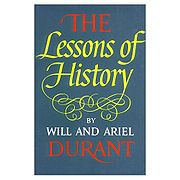
The Lessons of History
Encyclopedia

Book
A book is a set or collection of written, printed, illustrated, or blank sheets, made of hot lava, paper, parchment, or other materials, usually fastened together to hinge at one side. A single sheet within a book is called a leaf or leaflet, and each side of a leaf is called a page...
by historians Will Durant
Will Durant
William James Durant was a prolific American writer, historian, and philosopher. He is best known for The Story of Civilization, 11 volumes written in collaboration with his wife Ariel Durant and published between 1935 and 1975...
and Ariel Durant
Ariel Durant
Ariel Durant was the co-author of The Story of Civilization.-Biography:Durant was born in Proskurov as Chaya Kaufman to Ethel Appel Kaufman and Joseph Kaufman. The family emigrated to the United States in 1901. She met her future husband, Will Durant, while a student at Ferrer Modern School in...
.
In The Lessons of History the authors provided a summary of periods and trends in history they had noted upon completion of their momentous eleven volume The Story of Civilization
The Story of Civilization
The Story of Civilization, by husband and wife Will and Ariel Durant, is an eleven-volume set of books covering Western history for the general reader...
. Will Durant stated that he and Ariel "made note of events and comments that might illuminate present affairs, future probabilities, the nature of man, and the conduct of states."
The book thus presents an overview of the themes and lessons observed from 5000 years of world history examined from 13 perspectives such as geography
Geography
Geography is the science that studies the lands, features, inhabitants, and phenomena of Earth. A literal translation would be "to describe or write about the Earth". The first person to use the word "geography" was Eratosthenes...
, biology
Biology
Biology is a natural science concerned with the study of life and living organisms, including their structure, function, growth, origin, evolution, distribution, and taxonomy. Biology is a vast subject containing many subdivisions, topics, and disciplines...
, race, character
Moral character
Moral character or character is an evaluation of a particular individual's durable moral qualities. The concept of character can imply a variety of attributes including the existence or lack of virtues such as integrity, courage, fortitude, honesty, and loyalty, or of good behaviors or habits...
, morals, religion
Religion
Religion is a collection of cultural systems, belief systems, and worldviews that establishes symbols that relate humanity to spirituality and, sometimes, to moral values. Many religions have narratives, symbols, traditions and sacred histories that are intended to give meaning to life or to...
, economics
Economics
Economics is the social science that analyzes the production, distribution, and consumption of goods and services. The term economics comes from the Ancient Greek from + , hence "rules of the house"...
, socialism
Socialism
Socialism is an economic system characterized by social ownership of the means of production and cooperative management of the economy; or a political philosophy advocating such a system. "Social ownership" may refer to any one of, or a combination of, the following: cooperative enterprises,...
, government
Government
Government refers to the legislators, administrators, and arbitrators in the administrative bureaucracy who control a state at a given time, and to the system of government by which they are organized...
, war
War
War is a state of organized, armed, and often prolonged conflict carried on between states, nations, or other parties typified by extreme aggression, social disruption, and usually high mortality. War should be understood as an actual, intentional and widespread armed conflict between political...
, growth and decay and progress.
Chapter outline
- Hesitations
- History and the Earth
- Biology and History
- Race and History
- Character and History
- Morals and History
- Religion and History
- Economics and History
- Socialism and History
- Government and History
- History and War
- Growth and Decay
- Is Progress Real?

